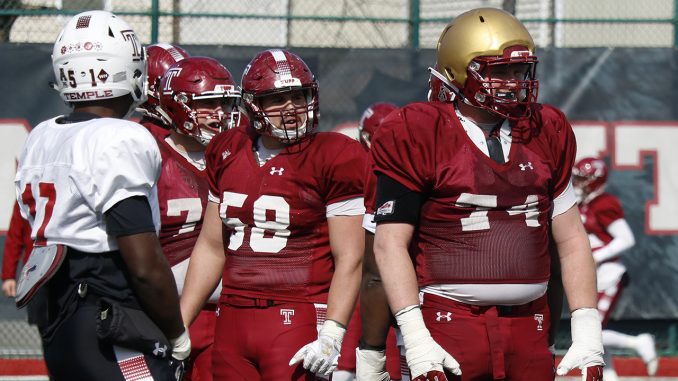
During the last two weeks of spring football practices, about 10 players began wearing protective shells on their helmets.
The shells are designed by Defend Your Head, a company based in Chester Springs, Pennsylvania, that makes equipment to supplement helmets and reduce the effects of collision impact in contact sports like football, hockey and lacrosse.
ProTech shells are made of a more slick material than traditional helmets so blows slide off quicker, according to Defend Your Head’s website. They fit the top of helmets and clip onto the ear holes.
Coach Geoff Collins found out about the shells at a Pennsylvania Scholastic Football Coaches Association clinic.
“I called our equipment guys and our athletic training staff and told them to investigate it because…anything that we can do for player safety, I’m all for,” Collins said.
Temple has about a dozen ProTechs and is working to add more within the constraints of its budget, Collins said. Some of the players who were wearing them have had a concussion in the past, he added.
Temple borrowed some of the ProTechs it used for the spring from North Carolina State University. It also received some from Roman Catholic High School at Broad and Vine streets.
Equipment manager Ken Slough had experience with ProTech during his two years at the College of the Holy Cross in Worcester, Massachusetts before he joined Temple in August 2017.
He worked with the product engineers to help them come up with the hook system, which allows ProTechs to be attached to helmets in less than two minutes, he said.
Slough stressed that there is no product on the market that will eliminate all concussions, but he said progress is being made.
“I think it will be something that you will see a lot more schools getting into, a lot more coaches inquiring about,” Slough said. “You need to protect the student-athletes. You need to protect their future, because unfortunately not all of them are going to go to the NFL or wherever and make millions of dollars.”
The ProTech can weigh slightly less or more than one pound depending on the model of helmet it needs to fit, said Defend Your Head Executive Chairman and CEO Glenn Tilley.
Redshirt-junior defensive back Kareem Ali and redshirt-senior offensive lineman James McHale were among the players wearing the ProTech. McHale said he didn’t have any neck soreness after wearing the protective shell.
“I think it’s great,” McHale said. “For me, I haven’t really noticed any weight difference or nothing. But yeah, I like it. [I’m] anxious to see how it holds up in fall camp.”
About 25 major colleges used ProTech during the spring football season, and about 40 are expected to use it during the fall, Tilley said. Dartmouth College, the University of Alabama at Birmingham and Penn State are among the Football Bowl Subdivision and Football Championship Subdivision programs using them, he added.
Defend Your Head conducted a three-year study at Penn State and found that ProTech was a significant factor in reducing traumatic head impacts for more than 70 percent of players.
ProTech is classified as an equipment add-on, and no NCAA guideline addresses it. Some athletic officials hope to bring it to their respective conferences to approve its use in games, Tilley said, and Defend Your Head hopes to eventually present to NCAA leadership.
First, the company wants to build validation on the field through the product’s continued use.
“Ultimately, we’re excited that we’re helping our young players be able to appreciate the game and do everything we can to make the game as safe as possible,” Tilley said.
Collins said Temple is still in the early stages of using the ProTechs, but he feels it is a positive measure for the team.
“With the concussion protocol that our athletic trainers and doctors have in place for our players, the way we teach blocking, the way we teach tackling, everything that we’re doing in this program is to try to take the head out of the game,” Collins said.



Thank you for your concern and effort to make football a safer and better game.
Lee Becker
Director, Football Safety Academy